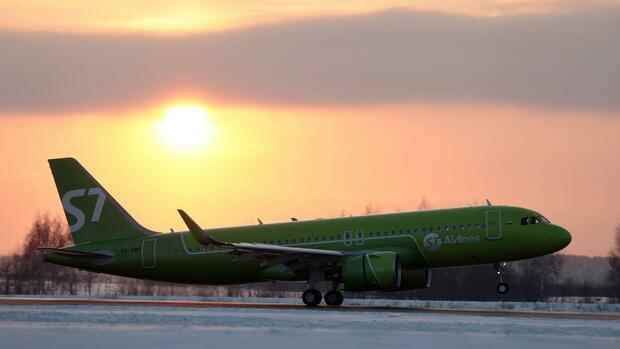Frankfurt Concerns are growing in Europe that planes operated by Russian airlines are no longer safe enough to take off and land in EU countries. A few days ago, EU Transport Commissioner Adina Valean blacklisted 21 airlines based in Russia and imposed a take-off and landing ban. There is probably no clearer indication that Russian aviation is struggling with serious problems.
Pobeda, the low-cost offshoot of Aeroflot, has already retired 16 of the 41 Boeing 737s as a precaution. Airline boss Andrei Yurikov wants to extend the spare parts that are still in stock for the remaining Boeing planes until Western companies are allowed to deliver again, as he explained to the Russian news agency Interfax.
However, it remains to be seen whether this will succeed. Aviation experts estimate how long stocks of important maintenance parts will last, differing widely in some cases. Some say that aircraft from Western manufacturers will hardly be able to take off in a few weeks. The others speak of a few months that the industry still has.
Top jobs of the day
Find the best jobs now and
be notified by email.
There are several reasons why forecasts are difficult to make. On the one hand, the airlines in Russia can use part of their fleet as a spare parts store. On the other hand, they could try to buy used aircraft in countries that do not support the sanctions and cannibalize them. Airlines in Iran have pursued a similar strategy during the long sanctions period.
Airline S7 has to stop its expansion
But that’s not easy. In the eyes of the Russian government, China is a “friendly state”. But the government there has already declared that it also does not want to supply any spare parts to Russia. Desperation in Russian aviation is growing day by day. The EU has calculated that three quarters of the commercially used airliners used by Russian companies are of Western production.
It is now clear that the war and the sanctions are throwing the industry back in Russia by years. This is shown by the example of S7, one of the up-and-coming airlines in Russia. The company operates a modern Boeing and Airbus fleet.
>> Read about this: How leasing companies are trying to get their jets back in Russia
Until the beginning of the war, the program included destinations in Europe and Asia. The airline has so far listed 196 destinations in 33 countries. S7 is also a member of the One World airline alliance around British Airways and American Airlines. Management had made plans for the post-pandemic period. A new low-cost subsidiary was to be founded and new goals set, also in Germany.
However, since Russia invaded Ukraine, S7 has been cut off from large parts of the world. Most of the jets are leased from major leasing companies. S7 management fears that these planes will be confiscated once parked outside of Russia.
The airline has therefore stopped all international connections and only flies domestically. Even that is becoming increasingly difficult due to the lack of spare parts. It is not known whether S7 will start cannibalizing aircraft to ensure the operation of a remaining fleet. So far, the airline has been considered extremely solid and reliable, also in terms of its financial obligations.
The war in Ukraine is now turning everything upside down. Even if this should come to an end at some point, the trust of Western leasing companies and aircraft insurers will be permanently damaged. It might take many years to fix that.
The Russian government is preparing for long-term troubled relations with the West. She therefore wants to ramp up production of Russian aircraft again. But that will hardly ease the pain of Russian airlines. There is simply a lack of sufficient production capacity in Russia for this. According to the Tass news agency, Rostec, a Russian state-owned company, has announced that it will only build 70 new TU-214 jets by the beginning of 2030.
The TU-214 is a medium-haul aircraft. With a maximum of 210 passengers, it is comparable in size to the Airbus A321. The advantage from the Russian point of view: almost exclusively Russian material is used in the aircraft. Even the avionics, i.e. the electronics that are important for control, are of Russian origin. So the sanctions of the West do not apply here.
No TU-214s in commercial service
The problem: Beyond size, the TU-214 and Airbus A321 are an odd pair. The TU-214 is certainly a modern aircraft. But the Airbus is significantly more efficient. The TU is considered very difficult and therefore thirsty. That is why it has so far hardly been used by Russian airlines. Currently, no aircraft flies in commercial service. The aircraft of this type that were built are mainly for the military.
Rostec boss Juri Slyusar nevertheless sees opportunities for the TU-214. He recently suggested that the government in Moscow could make the use of the jet palatable to Russian airlines by helping them with fuel costs. Such a measure would be conceivable. Finally, the Russian government has made it clear that one thing is important to it: people in vast Russia should be able to travel from one city to the next as before – regardless of all the sanctions from the West.
Ambitious entrepreneurs like Vladislav Filev, who founded S7, are unlikely to be satisfied in the long term. The entrepreneur is extremely busy. He had already formulated clear goals for the planned new low-cost offshoot: 40 new Airbus A320 neo should be added to the fleet, in 2025 the airline actually wanted to transport 16 million passengers per year. So far, however, Russian equipment has not featured in his business plan.
More: Nationalism – the new trauma of aviation
